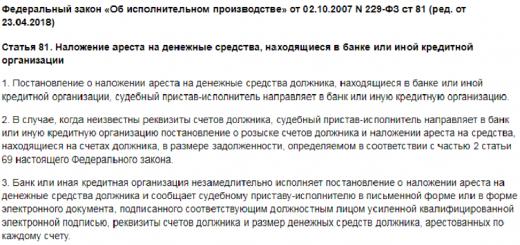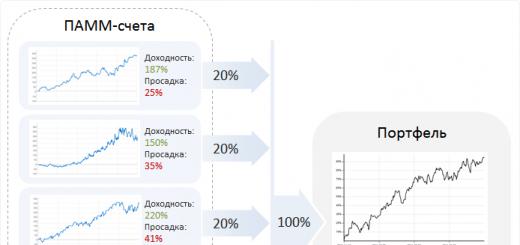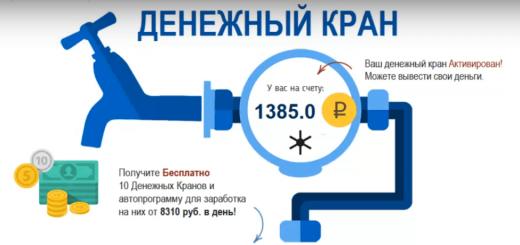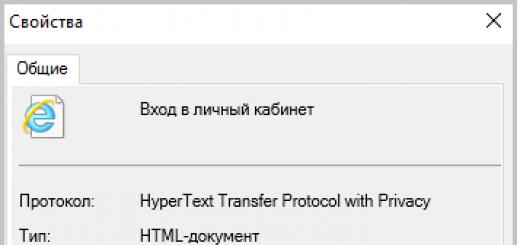Russians who do not trust the Russian banking system can place their funds in almost any foreign bank. But, having learned about the conditions for opening an account, many will most likely refuse this procedure. In order to open a deposit abroad, you need to have serious reasons - “increased” welfare and a transparent financial biography.
Possibilities
Currently, nothing prohibits Russians from opening an account (deposit) in a foreign bank. Law on currency regulation, updated last year, says a bank account can be opened without restrictions in any country that is a member of the OECD (Organization for Economic Co-operation and Development) or FATF (Financial Action Task Force on Money Laundering).
According to the same law, accounts in countries that are not members of these international organizations can be opened in the manner established by the Central Bank. In March 2004, the Central Bank issued instruction No. 1411-U, which states the obligation to pre-register such accounts or deposits. “But the registration procedure has not yet been established by the government and the Central Bank,” says the consultant law firm Roche & Duffay Sergey Budylin. Therefore, formally, guided by the principle “everything that is not prohibited is permitted,” you can open an account in any country without restrictions. “However, it is not a fact that this is exactly how the courts will interpret the law,” Budylin added.
The only condition required by law is that a Russian resident who has opened an account in any foreign bank must notify the tax office at his place of residence within a month. The tax authorities must also be informed about the closure of an account abroad.
And in order to avoid the temptation to bypass the tax authorities, the law obliged Russian banks to require citizens who wish to transfer funds to an account in foreign bank, certificate of notification tax office(or account registration certificate). Banks that do not want to lose their license with the wording “for laundering” will not undertake to transfer your money abroad without this piece of paper.
In general, the total fight against money laundering leaves bank clients with fewer and fewer opportunities for anonymity. This especially affects the procedure for registering numbered accounts. Deputy Manager of the Cyprus branch of Promsvyazbank Dmitry Kizenkov notes: “Current Cypriot legislation prohibits local banks from opening numbered accounts. Moreover, if funds are received in favor of a client of a Cypriot bank, but there is no information about the sender in the payment instructions (or there is a certain client code, as is practiced in some Swiss banks), the Cypriot bank has the right to credit the client’s account with money only after receiving from the correspondent bank accurate information about the sender of the funds.”
Kizenkov noted that Swiss banks have not abandoned the practice of opening numbered accounts for clients. Moreover, transfers from numbered accounts within Switzerland are permitted without restrictions. “However, cross-border transfers will in any case require disclosure of information about the account holder,” he says.
Formalities
Despite the fact that foreign banks carefully select clients, Russians have a chance to open an account in almost any country. Unlike residents or citizens of some countries, with whom most foreign banks prefer not to deal. As a rule, these are countries on the FATF blacklist, or offshore companies, as well as states with an unstable political situation or in a state of civil war.
There are also banks that are ready to deal only with residents of certain countries. Bankers explain that in this case the issue is not a suspicious attitude towards Russians, but the policy of an individual bank. Sergei Budylin notes that Swiss bankers have no prejudices towards Russian wealthy clients, but difficulties may arise when communicating with English banks. But in general, notes Dmitry Kizenkov, if a client wants to place a very large amount in the bank, for example $1 million, they can meet him halfway, provided that other conditions are met.
And a lot of formalities will have to be completed. A Russian who wants to open an account in a Swiss, English, Turkish or any foreign bank should pay attention to what the bank will require detailed information about a potential client.
Dmitry Kizenkov notes that there are practically no significant differences in the procedure for opening an account in a foreign bank and in a branch of a Russian bank abroad - the procedure and requirements will be almost identical, including the basic requirement of “know your client”. To open an account, the client will have to fill out a form where he will provide all the information about his place of birth, residence, work, and contact information. Information about the place of residence will have to be confirmed by documents - as a rule, these are utility bills issued in the client’s name.
The bank will also require letters of recommendation. “Recommendations can be given both by a well-known bank where the client is served in Russia, and by the employing company,” notes Pavel Neumyvakin, Chairman of the Board of Uniastrum Bank. “It’s best if the employer is a well-known company, and the bank that provided the recommendation is a member of SWIFT (so you can quickly contact it),” says Kizenkov. An ideal, but not obligatory, option is to add to the listed recommendations a letter from a client of the bank in which you want to open an account.
General Director of Bank Societe Generale Vostok, Michel Bricoux, says that to open an account abroad, a client who contacts the Russian branches of BSGV must provide copies of their passports (domestic and foreign), a certificate of employment and fill out an application for opening an account.
Intermediaries
An account in a foreign bank can be opened by contacting the bank directly (including through a bank representative office in Russia) or through intermediaries. Such services are provided by some Russian banks (especially within private banking), and Russian and foreign law firms. Bankers believe that it is better to avoid intermediary firms. “The company must act on behalf of a Russian resident who wishes to open an account abroad. In practice, it is very difficult to verify the activities of an intermediary company,” says Pavel Neumyvakin.
“If an individual who wants to open an account in a foreign bank acts through an intermediary, no one guarantees that information about your account will not be leaked,” says Dmitry Kizenkov. He notes that many foreign banks have recently opened their representative offices in Russia, and it is best for those who want to open an account to contact them there.
Sergei Budylin argues that a good intermediary company will be able to competently recommend a suitable bank to the client and advise on the legal and tax situation in the country. He noted that usually a European bank takes additional care of the security of transactions carried out by foreign clients. “The bank agrees with the client on how each order for account transactions will be confirmed. For example, an order sent to the bank by fax may contain a code word or be duplicated by a personal call from the client,” says Budylin.
Subsidiaries or representative offices of foreign banks in Russia also advise clients wishing to receive services abroad. General Director of the Bank Societe Generale Vostok Michel Bricoux says that opening accounts for Russian citizens abroad is among the services provided by BSGV in 80 countries of its presence. “Together we determine the goals that a person sets for himself, and depending on the result, we make him an offer that would best suit his needs. The timing of account activation depends on what issue the client came to us with and in which country we open the account,” says Bricu.
Money
As for the amount that should be applied to a foreign bank, everything is very individual, but almost always expensive. Swiss banks, specializing in private banking, usually do not work with clients wishing to place less than $100 thousand.
“The same can be said about many European banks,” recalls Sergei Budylin. According to him, you can find a serious bank that will agree to open an account for a private foreign client for 50 thousand euros (dollars), but a smaller amount is unlikely to interest anyone in Europe.
In other countries you can try your luck with smaller amounts. Branches of Russian banks abroad are also often picky. “You can open an account in the Cyprus branch of Promsvyazbank without limiting the balance amount,” says Dmitry Kizenkov.
The costs of opening an account in a foreign bank, as well as servicing it, are usually quite large and often exceed $1000. And banks’ requirements for a minimum account balance can amount to tens of thousands of dollars or euros.
“A client planning to open an account abroad needs to be prepared for global prices for banking services, which depend on each specific country,” says Michel Bricoux.
It is also worth keeping in mind that foreign banks often include a clause in deposit agreements about the possible suspension of operations on the client’s account if the information provided by him about himself is not true.
Translation
Once an account or deposit is opened abroad, all that remains is to transfer money to it. The simplest and most straightforward way is to transfer money from a foreign currency account to Russian bank. As we have already noted, Russian bank will undertake this operation only after you present evidence that the tax office knows about the existence of the account.
"Notification procedure tax authorities information on accounts or deposits opened abroad has also not yet been developed. Today there is no single form or document; everything depends on the individual inspection,” notes Sergei Budylin. You can carry money across the border in cash. But this method, firstly, is inconvenient (you cannot take out more than $10 thousand at a time through customs), and secondly, it will arouse the suspicions of foreign bankers.
After you have successfully opened a foreign account and transferred money to it, do not forget that by notifying the tax office about opening an account abroad, the resident automatically agrees to provide account statements at the request of the tax authorities. And once a year, resident individuals are required to submit to the tax office a report on the balances of funds in accounts (deposits) in banks outside the Russian Federation as of the beginning of each calendar year.
Both an organization and an individual can open a bank account abroad. But this is not easy to do. Those wishing to become clients of foreign banks located outside of Russia should prepare for various restrictions, as well as regular reports on the balance and movement of foreign money. Failure to comply with currency laws is punishable by severe fines, which in some cases reach multi-million dollar amounts.
How to open an account abroad for an individual
Having chosen a bank, you should carefully read its conditions for opening an account by foreigners. It is best to contact a representative of the financial institution by email to clarify the requirements, procedure and list necessary documents. Typically the list of required papers includes:
Russian passport;
international passport;
information about the applicant’s activities and income;
information about his family members;
a certificate that he has no criminal record;
When the papers are collected, a citizen who wishes to have an account in a foreign bank will have to visit two offices: a translation office to prepare English versions of documents, and a notary office to certify them. Both visits will require significant financial expenses, and they will increase rapidly from there.
Many large foreign banks require a potential client to personally arrive at the organization’s foreign office, where he hands over a package of documents and fills out a form. That is, if an individual permanently resides in Russia, expenses for flights there and back, and, possibly, for a temporary stay in a foreign country in this case, are almost inevitable. If you do not have a visa, you will need money to obtain one. Whether it is possible to open an account abroad remotely without traveling to another country should be clarified by phone or through the website of a financial institution. Some foreign banks provide this opportunity.
The citizen then awaits a decision foreign organization. As a rule, the waiting period ranges from 2-3 days to a month. And if the answer is positive, a bank account is opened for the individual abroad, which does not fall under the jurisdiction of the Russian Federation.
However, the state wants to know about citizens' foreign accounts. Before opening an account abroad, Russian citizens need to study Article 12 of the Law “On Currency Regulation and Control” (Law No. 173-FZ of December 10, 2003). It, in particular, talks about the need to notify tax authorities in writing within 30 days about opening a cash account abroad. The notification form is contained in the Federal Tax Service order No. ММВ-7-14/507@ dated 08.28.2018. In addition, annually (before June 1), a currency resident must inform the tax service about how he managed “foreign” money over the past year and what its balance is (Resolution of the Government of the Russian Federation dated December 12, 2015 No. 1365).
How can a company open an account in a foreign bank?
Organizations are very interested in opening an account outside the Russian Federation. An unstable financial market leads to the closure of both small and very large Russian banks. Because of this, companies that entrusted them with money suffer heavy losses, without any compensation from the state.
To selected financial institution the company presents an impressive package of documents. In particular, to open an account, foreign banks request:
foreign passports of persons who will be authorized to manage the funds stored in the account (Russian passports may also be needed);
power of attorney if the account is opened through a representative;
constituent documents of the company: memorandum of association, charter, etc.;
certificates – OGRN, TIN;
order on the appointment of a manager and chief accountant;
a document certifying that the organization is not subject to bankruptcy proceedings;
license (if it is necessary to conduct a certain activity);
completed form.
The specified list of documentation can be significantly expanded by a banking institution. Before opening an account in a foreign bank, a legal entity (as well as a citizen) needs to document the legal origin of the money, as well as the reason why it needs to become a client outside of Russia.
The company is also obliged to notify the tax service about opening an account abroad within 30 days after this event and report quarterly on the flow of money (Resolution of the Government of the Russian Federation dated December 28, 2005 No. 819).
Opening an account in a foreign bank: what to consider
When opening a bank account abroad in the Russian Federation, several circumstances should be taken into account:
Banks that open foreign bank accounts for foreigners do not do so for free. The “entry” cost for new clients has a wide range: in some banks it is 300 euros, in others it reaches $3,000. In addition, you will need to pay annually for servicing the foreign account. The cost of this service also varies - from several hundred to several thousand euros/dollars.
If an individual has opened a cash account in another state, the foreign bank will allow it to be used only for personal and not business purposes.
Through accounts located outside the Russian Federation, you can carry out not any operations, but only those that are named in the 12th article of Law No. 173-FZ. Some of them, for example, receiving money from the sale to a non-resident of real estate located in another state, are permitted only if the account is opened in a bank in the territory of a member country of intergovernmental organizations such as the OECD or FATF.
For carrying out illegal transactions, an individual or legal entity faces an administrative fine in the amount of 75 to 100 percent of the amount of the transaction (Article 15.25 of the Code of Administrative Offenses of the Russian Federation). This article should be read carefully before opening a bank account abroad. It provides for various sanctions for violation of currency laws.
In recent years there has been new trend: foreign banks choose non-resident clients with caution, and the “tightening of the screws” due to the requirements of financial institutions at various levels affected both individuals and legal entities. Nevertheless, the issue of storing money abroad is still relevant for Russians and citizens of the CIS.
Why trust money to foreign banks?
For citizens of the Russian Federation, having a bank account in another country is an important condition for employment abroad, obtaining a residence permit, and purchasing real estate. Storing funds abroad, investing in local companies help preserve and increase capital. In addition, opening a multi-currency account will allow you to save money when making purchases and paying for services abroad.
For a business, a corporate foreign account is:
- insurance against financial shocks (changes in foreign exchange controls, inflation, devaluation);
- maintaining confidentiality;
- positive impact on business reputation;
- the opportunity to attract new partners to cooperation;
- opportunity to use international credit offers.
Note! Finance abroad is limited in functionality: residents of the Russian Federation are allowed to transfer only certain categories of income to foreign accounts. For example, since 2018, restrictions have been lifted on income received from the sale of foreign real estate, shares, as well as non-cash transfers from domestic banks.
When opening, the type of account is indicated:
- Settlement: allows you to conduct frequent transactions (accrual or write-off financial resources). This is important if you plan to trade or provide services to foreign partners. The bank has the right to set a limit on the minimum non-expendable amount, which must remain regardless of the volume of transactions.
- Savings (accumulation): help to increase savings, so using them for current payments is very problematic.
What do individuals need to know about opening a foreign account?
The first thing that citizens of the Russian Federation will face is the choice of a country suitable for this purpose. Not all states are ready to provide financial services to non-residents without a residence permit or real estate. For example, financial institutions in Singapore and Scandinavian countries require additional documents explaining the origin of savings, but the Latvian Rietumu Banka, on the contrary, is ready to cooperate with foreigners through a remote service.
Banks have a limit on the minimum deposit size: Barclays and UBS ask to deposit a minimum of € 50,000 to open, and the Chinese Bank of China or ICBC only needs ¥ 20 (about 200 rubles). In addition, almost all foreign financial institutions do not allow non-residents to open accounts for doing business.
When choosing a bank you should consider:
- rate and interest;
- guarantees of deposit safety (including from local authorities);
- the amount of the non-expendable balance on the deposit;
- deposit insurance conditions;
- the need for a personal meeting with the manager.
In some institutions (Deutche Bank, Credit Suisse, BPI) you cannot use the services of an intermediary - the manager will definitely want to communicate in person. Be prepared to be asked to show documents about the origin of the money, recommendations from other financial institutions or partners.
How to choose a bank for a corporate account?
Even if we are not talking about an offshore company, choosing a suitable institution becomes a difficult task. Here are just a few points to pay attention to when analyzing offers on the market banking services:
- does the bank work with companies from the Russian Federation;
- is it possible to open current accounts;
- is service available to a company with the specified type of activity, list of beneficiaries, partners, as well as specific directions of transfers and payments;
- types of currencies for transactions;
- bank rating, its reputation financial market, indicators of recent years, development prospects.
If it is not possible to conduct a complete analysis yourself, you should seek help from specialists. They have all the up-to-date information, so they will be able to assess the risks for each specific company.
If we talk about countries, then for legal entities it is recommended:
- European banks (Baltic countries, Central and Western Europe, Cyprus, Montenegro): enjoy the well-deserved trust of foreign companies and are often ready to provide support in Russian. The disadvantages include increased processing times for documents, requests for additional information (up to tax reports for several years), high maintenance costs, and the impossibility of opening an offshore company.
- Asian financial institutions(Singapore, Hong Kong): give preference to companies doing business in eastern region, they must conduct an independent expert assessment of the investor’s assets. It is very difficult for a company from Russia to gain a foothold in Hong Kong: in addition to face-to-face conversation (by no means in Russian), from legal entity will be required to open a representative office in Hong Kong (and also regularly pay local taxes). Another disadvantage is that there are no Russian-speaking specialists from the support service, there is a big time difference.
- Offshore banks: severely limit settlements with certain countries and national currencies. Not recommended if you need to make USD payments, as well as for settlements with companies from the USA and the European Union.
As a rule, the foreign banking sector refuses startups (they cannot indicate partners, confirm relevant experience), and businesses with high risks (cryptocurrencies, blockchain, precious metals). Companies operating in the fields of trade, logistics, finance, and IT projects have a high chance of approval.
Algorithm for opening an account abroad
The procedure for the main actions is the same for any banking institution abroad.
2. Filling out the necessary forms. Providing additional information (documented) to the manager. Each bank has the right to make its own list of requirements, including:
- statutory documents (for legal entities);
- confirmation of the type of commercial activity;
- information about counterparties, content and direction of future payments;
- information about the owners of the company (individuals);
- volumes of funds movement (annual turnover, frequency of transactions, amount of non-expendable balance).
3. Waiting for a decision on the submitted application (from 7 to 60 days).
For individuals the list of documents contains:
- document proving identity and place of residence;
- income certificates, employment contract confirming the availability of a source of finance;
- Bank statements;
- receipts for payment of taxes and utility bills;
- certificate of no criminal record;
- information about family composition.
In case of a positive decision, the non-resident receives information about the account number, free access to Internet banking, and, if necessary, a plastic card.
Collection of information by the bank
Compliance is an internal banking procedure that allows assessing the integrity and reliability of the client from all sides. The submitted documents are checked, as well as information from other sources.
To collect information, the bank adheres to the principles of “due diligence” and “know-your-customer”. Such a check is a consequence of decisions of national regulators (and in the case of EU countries - international ones) to combat the financing of terrorism and laundering of “dishonest” proceeds.
Russians who decide to keep money abroad should take care in advance to document their commercial activities, sources of wealth, tax or utility payments.
CRS (Common Reporting Standard): what you need to know about international information exchange
Since the fall of 2018, Russia has fully participated in the international program for exchanging information on bank accounts according to the CRS standard. From now on, all foreign banking companies send the Federal Tax Service of the Russian Federation information about private and commercial accounts abroad, the owners of which are Russian citizens.
Subject to exchange:
- passport data, TIN;
- numbers of current and savings accounts;
- information on the account status at the end of the reporting period (closing), types of assets.
To date, the Agreement has been activated by about 60 countries, including the European Union and the Asian region.
Financial reporting abroad
If a citizen of the Russian Federation lives in the country for more than six months, he is considered currency resident. Therefore, any account opened abroad must be declared in accordance with current legislation. A citizen is obliged:
- inform the Federal Tax Service about the opening or closing of a foreign account, changes in its details;
- send a report on the flow of funds for the past period by April 30 of each year;
- comply with restrictions on foreign exchange transactions provided federal law N 173-FZ.
Instead of a conclusion
For CIS citizens, foreign banks still remain one of the profitable options saving and increasing funds. However, finding a suitable financial institution is not easy: every year the requirements for non-residents are becoming more stringent.
In order not to waste time and money, we recommend turning to accredited intermediaries. They will help you make a choice taking into account your goals (for private or corporate use, investments or payments), type of currency, characteristics of commercial activity, and region. To minimize risks, be sure to take into account when making a decision financial policy states, as well as geopolitical factors.
A simple formality
The reporting is quite simple, says Zakharov: a form of two sheets, on the first - the applicant’s data, on the second - information on accounts in a foreign bank. If there is more than one account, then the first sheet and several copies of the second sheet, equal to the number of accounts, must be submitted to the Federal Tax Service, he says.
Once the IRS receives your report, they may have additional questions. The press service of the Federal Tax Service confirms this: for “the purposes of currency control” it has the right to request additional documents.
In this case, the taxpayer has a week to provide the necessary papers - for example, a statement of cash flows bank account, says lawyer of the legal service CorpLaw.Pro Yulia Mikhalchuk. “It’s better to get these documents in advance from the bank,” advises Zakharov. According to him, most likely, traffic statements may be needed Money and letters about the opening and availability of accounts in such banks.
Mikhalchuk from CorpLaw.Pro also notes that it is not necessary to travel to the country where the bank is located - you can receive statements by email. The lawyer, however, fears that the Federal Tax Service will be able to demand documents with seals. “So far no one knows how to circumvent this rule, and perhaps clarifications from the Ministry of Finance or amendments to laws will be necessary,” she says.
Immediately after submitting the report, you may encounter several problems.
Tax problems
First of all, you will have to pay taxes. Personal income tax at a rate of 13% is levied on any income from bank accounts abroad: this includes coupon income, and rent from leasing foreign real estate, and sales valuable papers through management company. Also, since the beginning of 2016, income tax has been imposed on interest on deposits in a foreign bank, recalls Zakharov from Paragon Advice Group.
The 2015 declaration campaign ended on April 30. Mikhalchuk says that it was necessary to report on income received, including to foreign accounts, using Form 3-NDFL. Non-payment or incomplete payment of taxes under Article 122 of the Tax Code means a fine of 20 to 40% of their amount.
If the tax on income, for example, received from renting out real estate, is paid in the same country where the foreign account is opened and exceeds 13%, then nothing needs to be paid in Russia, notes Klenov from UFG Wealth Management.
But so that the Federal Tax Service does not have questions, it is better to provide it with a tax return from another country and payment documents if you manage your real estate yourself. If a trustee is doing this, then you need to get a certificate from him: he is the tax agent in this case, says Klenov.
According to Zakharov, you can avoid claims for taxes for previous years using a capital amnesty - submit a special declaration before July 1, 2016. “It must indicate the balance of the account abroad and attach a notice of opening the account. This removes the possibility of suing you for tax evasion,” he says.
Problems with currency legislation
Most Russian citizens are not only tax residents, but also currency residents. This concept appeared in 2012. According to the law on currency regulation, this is all citizens who have a Russian passport, except for those who have been living abroad “for at least a year” on a residence permit, work and study visas.
PwC partner Maxim Kandyba says that the phrase “at least a year” means: just show up in Russia for a day, and you are a currency resident. Zakharov, however, believes that the fact of registration at the place of residence or stay is important here. If we are talking about emigration, then the citizen is eventually discharged from his home in Russia, and tracked in tax purposes his short visits to his homeland are difficult, he says. According to the Russian law on the right to freedom of movement, a citizen is required to register at his place of stay within 90 days.
Foreign currency residents have greater restrictions on the use of foreign accounts. They are allowed to transfer funds from other banks (including Russian ones), credit interest on deposits, deposit cash and make a profit from converting funds.
All these norms are listed in Article 12 of the Law on Currency Regulation. In addition, salaries, travel allowances, social payments - pensions, scholarships, benefits - can be credited to these accounts. But you cannot receive grants for them, the Ministry of Finance clarified at the end of 2015. This is a violation of currency laws.
In countries that are members of the OECD and FATF, you can additionally credit foreign accounts with loans and credits in foreign currency, income from rental housing, coupon income on securities, as well as income from the trust management of your funds (if they are managed by a non-resident of Russia) . For example, Bulgaria, Montenegro and Cyprus, which are popular among Russians, are not included in either the FATF or the OECD.
All operations not included in this list are prohibited, otherwise you will face a fine, says UFG Wealth Management partner Dmitry Klenov. Paragon Advice Group partner Alexander Zakharov clarifies that the fine can range from 75 to 100% of the amount of the prohibited transaction. The same is said in Article 12.25 of the Code of Administrative Offenses.
In reality, it looks like this: if your foreign account received a profit of $100 from the sale of securities (this operation is not allowed by currency legislation), the fine could be from $75 to $100. It can be avoided by taking advantage of the capital amnesty, Klenov admits. It applies to all illegal transactions on foreign accounts on the date of filing the special declaration, says Zakharov. You can submit your declaration until July 1, 2016.
Hiding accounts
Reporting to the Federal Tax Service on foreign accounts means a huge number of problems - from obtaining statements from foreign banks to the possibility of tax and currency claims. “Everything is done so that a person will no longer have the desire to use foreign accounts. I believe that most citizens will not report,” says one of the consultants on condition of anonymity.
What awaits them in this case? According to currency legislation, if you did not report the account at all and the Federal Tax Service eventually becomes aware of it, you will have to pay a fine of 4 thousand to 5 thousand rubles. The fine for late notification is from 1 thousand to 1.5 thousand rubles. The penalty for not having time to provide documents on the movement of funds in the account is approximately the same: 10 days or less - from 300 to 500 rubles, more than a month - from 2.5 to 3 thousand rubles. Repeated violation will cost 20 thousand rubles.
Violating tax laws is more expensive. If you did not report your account abroad to the tax service at all and at the same time received income on it for many years, this is already tax evasion, Klenov argues. In this case, the Federal Tax Service may require you to pay additional taxes and issue a fine: from 100 thousand to 300 thousand rubles. depending on the underpaid amount.
International Financial Consultant FCP (Financial Management) Ltd. Isaac Becker is confident that the accounts will eventually become known. “Even if you remain silent today, the information will sooner or later appear in the tax service, and subsequently they will knock on your door not only for a fine,” he says.
On May 12, Russia signed an international agreement on the automatic exchange of financial information, which includes more than 80 countries. “It will begin in 2018, and the first reports will most likely be based on the results of this year,” says Zakharov. However, according to him, for this Russia will still have to conclude an agreement with each of the countries separately - only then the mechanism will begin to work.
Klenov says that for now Russia can request information about the foreign currency accounts of specific citizens for earlier years - up to 2002. Therefore, Becker advises those who have accounts abroad not to delay and to report them to the tax office in a timely manner, taking advantage of the amnesty.
What awaits rentiers, students, emigrants and traders when using foreign accounts
Rent from renting foreign housing
It all depends on where the foreign account is opened, into which income from rental housing is received. If in OECD and FATF countries, then you act within the law, says Maxim Kandyba. If in other countries, the forecast is disappointing: you are violating currency laws. In this case, income from the rental of property is in any case subject to personal income tax at a rate of 13%.
Account report
Tax law:
— 13%
tax if the account is opened in “permitted” OECD and FATF countries
from 20 to 40% from the sum
Currency legislation:
- fine from 75 to 100%
from 300 rub. up to 3 thousand rubles.; for repeated violation - 20 thousand rubles.
Hiding an account
Tax law:
- requirement to pay additional taxes at the rate 13%
- fine from 100 thousand to 300 thousand rubles. for tax evasion
Currency legislation:
- fine 4-5 thousand rubles.
- fine from 75 to 100% credited funds (if the account is not in “permitted” countries)
Withdrawing money abroad before emigration
This is the simplest case: you yourself transfer money from a Russian account to a foreign one. You simply cannot fail to report the opening of an account abroad: a Russian bank will immediately require a notification with a mark tax service about opening an account in a foreign bank. Otherwise, the translation simply will not be released from Russia, says Alexander Zakharov.
Account report
Tax law:
- tax 13%
from interest on account balance
- possible fine for non-payment of tax from 20 to 40% from its amount
Currency legislation:
— possible fine for being late with the report on the movement of funds in the account from 300 to 3 thousand rubles.; for repeated violation - 20 thousand rubles.
Hiding an account
- Impossible
Foreign University Scholarship
If a person studies abroad, he is not a tax resident of Russia at all, Zakharov believes. However, if training, as is usually the case, began in September, and the student spent more than half of the year in Russia, then he remains a tax resident. At the same time, a student may become a currency resident if his studies last less than a year or he comes to Russia from time to time. The very fact of receiving a scholarship does not violate currency laws in any way: it is a completely permitted operation. The only exception is grants: they cannot be credited to foreign accounts. In addition, the scholarship is not taxed at all in Russia (this is stated in Article 217 of the Tax Code).
Account report
Currency legislation:
— Possible fine for being late with the report on the movement of funds in the account from 300 to 3 thousand rubles.; for repeated violation - 20 thousand rubles.
Hiding an account
Currency legislation:
- fine 4-5 thousand rubles. for lack of account report
Emigration, salary in a foreign company
You do not violate Russian currency legislation, even if you remain a citizen of Russia. You can receive your salary into an account abroad. Most likely, you are not a tax resident of Russia: you become one only by being in the country for more than 183 days a year. This case assumes that you have deregistered in Russia and no longer live here, so there is no need to talk about currency residency. Short-term visits to Russia do not oblige you to anything: the requirement to register at the place of stay occurs only for trips lasting more than 90 days. In this case, there is no need to report on foreign accounts. However, if you decide to return to Russia for permanent residence, you will have to report, but from scratch.
Account report
- Not needed
Hiding an account
- Has no consequences
Securities trading
This is the most difficult case: the number of permitted transactions with securities in the currency legislation is limited. In fact, you can only receive coupon and interest income on securities, as well as payments on bonds. But only in OECD and FATF countries. Since the beginning of 2016, income from trust management has also been allowed to be credited to accounts abroad (if the manager is not a resident of Russia), explains Maxim Kandyba.
All this income is subject to personal income tax at a rate of 13%. At the same time, tax is also levied on exchange rate differences: if you bought a bond for $100 and sold it for $100, then it is likely that you still made a profit in rubles due to the rise in the dollar exchange rate and will pay tax, recalls Filinov from PwC. According to Zakharov Advice Group, from January 1, 2018, permission to credit income from the sale of securities themselves to foreign accounts will come into force. But for now this is a serious violation: the fine for it is 75-100% of the amount of income. At the same time, the redemption of bonds is not a transaction for the sale of securities, and therefore is permitted by currency legislation, Zakharov asserts.
Account report
Tax law:
- tax 13%
from income (if the account is opened in “permitted” countries)
- possible fine for non-payment of tax from 20 to 40% from the sum
Currency legislation:
— possible fine for being late with the report on the movement of funds in the account from 300 rub. up to 3 thousand rubles.; for repeated violation - 20 thousand rubles.
- fine from 75 to 100%
Hiding an account
Tax law:
- requirement to pay additional taxes at the rate 13%
- fine from 100 to 300 thousand rubles. for tax evasion
Currency legislation:
- fine 4-5 thousand rubles. for lack of report
- fine from 75 to 100% funds credited (if the account was credited with “unauthorized assets” in “unauthorized” countries)










